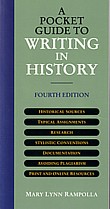Course Specifics
(back to top)
Each student in the seminar will undertake a major research
project, resulting in a paper of 60-70 pages. The research and
writing will be under the primary direction of a mentor whose area
of scholarly expertise correlates with the topic of the paper. Students
who want to enroll in History 194H must first discuss their plans with
a mentor and obtain her or his support.
The honors seminar director presides over the regular
meetings of the seminar, reads and comments on the prospectus and successive
drafts of the research papers, and supplements the advice of the mentor.
The final grade awarded to each paper is determined in consultation between
the seminar director and the mentor.
Outside funding is available through the Special Programs Office
of the College of Letters and Science. Applications, including a proposed
budget, are due early in the Fall quarter. Recipients of grants must keep
records of their expenditures and will be asked to submit a report at
the end of spring quarter.
Each student will have two peer reviewers in the seminar, who,
in addition to the director and the mentor, will read and comment on her
or his work. The quality of these reviewing efforts is calculated into
each student's final grade in the course.
The seminar director will evaluate each student's work and give a provisional
grade at the end of Fall and Winter quarters, based on the work during
that quarter. These evaluations may affect the student's final grade.
At the end of Spring quarter each student will present her or his
paper both to the seminar, and at a departmental colloquium.
Seminar discussions are central to the program and attendance
is, of course, mandatory. The high quality of most of the papers produced
in the seminar is intimately linked to the intensive process of reading
and re-reading, discussion and reflection, polishing and repolishing,
under the guidance of other students and professors.
Seminar participants will read and comment on papers from a wide
spectrum of periods and areas-possibly ancient, medieval, or modern; American
or European; African or Asian. Of course none of us will be experts in
all of those periods and areas, but an underlying assumption of this seminar
is that, as humanist-historians, the participants will have wide-ranging
interests and a willingness to delve into unfamiliar areas. Relatedly,
each paper is to be written in such a way that intelligent, non-expert
readers will be able to follow its arguments.
Students in the honors seminar must be responsible adults who will maintain
an appropriate level of research and writing throughout the three quarters,
meeting all deadlines without constant reminders and exceptions.
Students who are unable to assume this responsibility will be asked to
drop the course. Similarly, students who prefer to work alone, without
constant interaction and critique from others, are advised to avoid this
seminar. |
